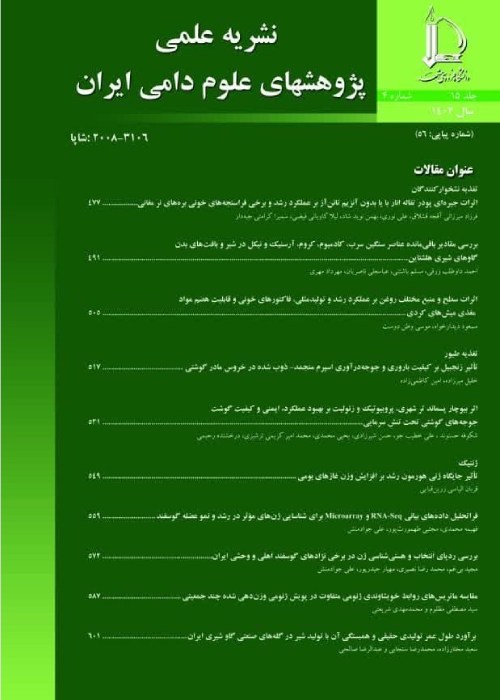Effect of adding herbs (Ziziphora clinopodioides, Mentha spicata and Mentha pulegium) in milk on performance, blood metabolites and fecal microbial population on Holstein calves
Author(s):
Abstract:
Introduction
Many herbal products (herbs and essential oils) are currently used as feed additives by the feed industry in the European Union and elsewhere. These phytogenic substances which increase feed aroma or palatability of feeds are classified as sensory additives by European Council. However, several publications show that some essential oils may have beneficial effects on animal performance and health status because of other properties except their sensory characteristics. These claimed properties are stimulation of digestive secretions; antimicrobial, coccidiostat, anthelmintic, and anti-inflammatory activities; and antioxidant properties. Most research revealed that supplementing herbal essential oils to diets resulted in reducing blood cholesterol, increasing palatability of feed and stimulating the immune system in poultry, while different results obtained by ruminants because of rumen microbial population and ruminal fermentation conditions. The use of large and repeated quantities of antibiotics in animal feed may cause to eliminate beneficial intestinal microflora and innate immune system and subsequently cause to antibiotic resistance and remains antibiotics in animal products. Recently, many herbal products because having flavoring and antimicrobial properties as introduced as good alternatives for antibiotics. The aim of the present investigation was to study of effect of Ziziphora clinopodioies, Mentha spicata and Mentha pulegium on the performance of suckling calves, dry matter digestibility, blood parameters and the immune system, the effect on the incidence of diarrhea and fecal microbial population (Escherichia coli, lactobacillus and total aerobic bacteria).Materials And Methods
In the present study, extraction of essential oils from three plant species (Ziziphora clinopodioies, Mentha spicata and Mentha pulegium) by means of gas chromatography coupled to mass spectrometry (GCMS) were analyzed. In order to determine the chemical composition of plants used for food such as dry matter, crude protein and ether extracts, from conventional laboratory methods AOAC (2005) were used. sixteen Holstein calves with mean of 42.18± 0.71 Kg birth weight, aged 5± 3 day allocated to treats: 1) control (milk without additive), 2) milk contains powder Ziziphora clinipodioides, 3) milk contains powder Mentha spicata, 4) milk contains powder Mentha pulegium. The herbs added to milk in each treatment was 20 g daily. Duration the experimental period was 25 days. Dry matter intake, water intake and fecal score measured daily. Body weight monitored every 5 days, and blood sampling conducted twice, once one day before the start of the period (day zero) and once final day. Samples for culture prepared in three phases beginning, middle and end of the period.Results And Discussion
The major component in Ziziphora clinopodioies was pulegone (38.34%), major component in Mentha spicata and Mentha pulegium was carvone (61.93%) and piperitone oxide (43.09%), respectively. The dry matter of three plant, Ziziphora clinopodioies, Mentha spicata and Mentha pulegium were 92.70, 93.25 and 94.01, crude protein were 8.57, 20.47 and 17.32, and also ether extracts were 3.20, 2.15 and 2.50 percent, respectively. Based on the obtained results, adding of Mentha pulegium to milk reduces dry matter intake during starter period and total dry matter intake in treatment Ziziphora clinopodioides was significantly higher than treatment control. Calves treated with Ziziphora clinopodioides, Mentha pulegium and Mentha spicata consumed statistically more water than control group. Dry matter digestibility significantly decreased in treatments Ziziphora clinopodioides and Menthe spicata compared to control. Daily gain, feed conversion ratio, blood parameter and immune respones were not affected by treatment trials. There were no significant differences between treatments for fecal score and day of diarrhea. Ziziphora clinopodioies, Mentha spicata and Mentha pulegium significantly decreased Escherichia coli and Lactobacillus count in fecal compare to control, but they had no significantly effect on total number of aerobic bacteria. The result showed that adding herbal to milk in neonatal calves have positive effect because of affecting on starter intake, consume water, fecal consistency score and intestinal microbial population.Conclusion
Plant-derived essential oil may be a useful means to improve efficiency of nutrient utilization in ruminants and reduce the impact of their production on the environment. This study showed that the inclusion of Ziziphora clinopodioies, Mentha spicata and Mentha pulegium calves diet significantly improved the water intake and Mentha spicata and Mentha pulegium decreased dry matter intake. Escherichia coli and Lactobacillus reduction microbial population fecal calves represent the three species of the plant is antibacterial. However, further and more complete evaluations are required to establish the effect of herbal products in diets on the performance of animals.Keywords:
Language:
Persian
Published:
Iranian Journal of Animal Science Reaserch, Volume:8 Issue: 1, 2016
Pages:
57 to 71
magiran.com/p1571903
دانلود و مطالعه متن این مقاله با یکی از روشهای زیر امکان پذیر است:
اشتراک شخصی
با عضویت و پرداخت آنلاین حق اشتراک یکساله به مبلغ 1,390,000ريال میتوانید 70 عنوان مطلب دانلود کنید!
اشتراک سازمانی
به کتابخانه دانشگاه یا محل کار خود پیشنهاد کنید تا اشتراک سازمانی این پایگاه را برای دسترسی نامحدود همه کاربران به متن مطالب تهیه نمایند!
توجه!
- حق عضویت دریافتی صرف حمایت از نشریات عضو و نگهداری، تکمیل و توسعه مگیران میشود.
- پرداخت حق اشتراک و دانلود مقالات اجازه بازنشر آن در سایر رسانههای چاپی و دیجیتال را به کاربر نمیدهد.
In order to view content subscription is required
Personal subscription
Subscribe magiran.com for 70 € euros via PayPal and download 70 articles during a year.
Organization subscription
Please contact us to subscribe your university or library for unlimited access!



